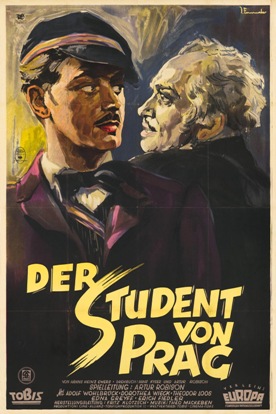
Balduin (Anton Walbrook) is a popular student and a skilled fencer, who has won the heart of Lydia, a young innocent girl. At her birthday celebration he becomes obsessed with Juila (Dorothea Wieck), an opera singer. But she already has two admirers, the foppish Baron Waldis and the sinister Dr. Carpis (Theodor Loos). While Julia appears fond of Balduin, she says she cannot see him, but she does not explain that it is because she fears what Carpis might do to him. He assumes it’s because he’s poor, so he doesn’t even question when Carpis says that he can give him a “lucky hand” to win Julia, as long as he gives up his sentimental dreamer side by never looking in his mirror. Balduin becomes rich from gambling, but of course, things start to fall apart soon after.
This is a fairy tale, a very simple story with a very simple message. With all that simplicity, it would be more fitting as an episode of a 30 minute anthology show. Anything it had to say it said again and again. And I knew everything that would happen long before it did. Sure it looks good, though not in any particularly interesting way. And the acting is reasonable, though not remarkable. The characters were all fine (though Balduin seemed like an ass for how he treated Lydia before any magic was introduced), but are no more complicated than necessary for their part in the story. Which leaves us a film that would be engaging for about a half an hour,
It had been made twice before, both times as silent pictures, with some alteration on how the reflection functions, and with the sorcerer more clearly the devil. Those films were more expressionistic, particularly the 1913 version, but this was 1935, and Hitler wasn’t a fan of expressionism. I wonder if politics was also the reason why the woman was changed from a lady of the upper class to an opera singer. Of the three, I prefer the 1926 version starring Conrad Veidt, and I’m not a particular fan of silent film.